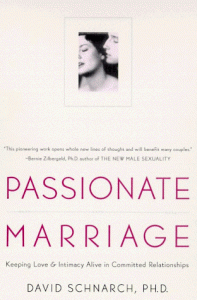Passionate Marriage (in 6 Simple Steps)
 Couples’ lit spotlight: Passionate Marriage: Keeping Love and Intimacy Alive in Committed Relationships, by sex/relationship therapist, David Schnarch. The book samples actual sex therapy sessions to make its case.
Couples’ lit spotlight: Passionate Marriage: Keeping Love and Intimacy Alive in Committed Relationships, by sex/relationship therapist, David Schnarch. The book samples actual sex therapy sessions to make its case.
Don’t care to read 400 pages about how differentiation? Try the six-point plan linked from Schnarch’s website, posted here minus the explanations:
- Operate from the Best in Yourself.
- Sustain eye contact with each other out of bed.
- Try Hugging ’till Relaxed.
- Make eye contact in bed.
- Change your style of sexual interactions.
- Pay attention to depth of involvement with your partner during sex.
Also via PassionateMarriage.com, here’s a Sex in Relationships Survey, which pretty much communicates what Schnarch is aiming at while rating your sex life on a 11 – 55 scale.
Choice v. Anxiety
The client knows best–studies catching up: Flexible Treatment Intervention Associated With Greater Improvement In Anxiety Symptoms (Medical News Today).
Singing Away IBS
Study: Irritable Bowel Syndrome felled by song.
Previous studies have demonstrated the beneficial psychological and biological effects of singing, with associated feelings of relaxation, energy and joy. An inter-university Swedish study has set out to test whether there were any additional stress-related benefits from choir singing in comparison with other group activities…
(Via GoodTherapy.org.)
Focus on the Family
A massive anthropological study of American family life is complete. Cameras on 32 families; 1,540 hours of video.
“This is the richest, most detailed, most complete database of middle-class family living in the world…What it does is hold up a mirror to people. They laugh. They cringe. It shows us life as it is actually lived.”
Postpartum Depression in Dads
From the L.A. Times: Postpartum depression affects fathers too [link now inactive[.
“We are expecting dads to be more involved in parenting than we ever have before…Most dads are welcoming of that, but they don’t have any models about what a dad is supposed to do. That creates uncertainty, and that uncertainty can lead to anxiety and depression.”
Divorce Risk
On the NYT’s Well Blog, a collection of divorce articles and assessment tools. Plus news:
Divorce rates have actually declined since peaking in the 1970s, and 10-year divorce rates have dropped dramatically with each generation.
Stress Management Pages
The stress management section of MayoClinic.com has lots and lots and lots of ideas about how to handle stress. Here, a sampling of links:
Stress relief: Learn how to say no Discover the why, when and how of saying no to reduce stress.
Forgiveness Forgiveness and letting go can lead you down the path of healing and peace.
Massage Explore the health benefits, potential risks and what to expect from massage therapy.
Meditation Learn quick and easy ways to meditate, no matter where you are.
Tai Chi for Stress, Anxiety, and Depression
Science Daily: Tai Chi Gets Cautious Thumbs Up for Psychological Health.
[A study] found that practicing Tai Chi was associated with reduced stress, anxiety, depression and mood disturbance, and increased self-esteem.
What’s Tai Chi? Wikipedia’s answer is here.
Chronic Pain Anonymous
Added to the resources page here, Chronic Pain Anonymous. New and not huge, you’re more likely to find online or phone meetings than one nearby. From the site:
How do I know if I may benefit from Chronic Pain Anonymous?
If your life is managed around your experience of pain and if you make choices in activities, careers, entertainment, or any other actions depending upon how much pain you are experiencing, than you may just be experiencing chronic pain. If you can answer the following statement with an unequivocal yes:
• I admit that I am powerless over my pain-and my life has become unmanageable.
… then you may benefit from Chronic Pain Anonymous
Los Feliz Psychotherapy
Happy to announce that I’m now seeing clients in Los Feliz, 90027. In addition to the therapy offices in Silver Lake and Beverly Hills, I’ve now got office space on a nice, tree lined street just off Hillhurst. Same therapy, same therapist; extra location.
Please call of write if you’d like to arrange an appointment.
